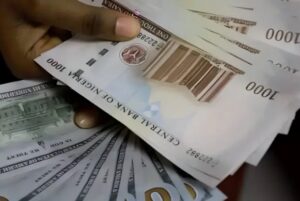Naira’s Depreciation Drives Surge in Foreign Portfolio Investments by 155.5%
Naira’s Depreciation Drives Surge in Foreign Portfolio Investments by 155.5%
By Peter Egwuatu

Naira and Dollar
Foreign Portfolio Investments (FPIs) on the Nigerian Exchange Limited (NGX) hit a record high, reaching N744.34 billion during the ten months ending October 31, 2024 (10M’24), marking the highest level since 2018. A detailed breakdown reveals a 180.9% surge in inflows to N344.3 billion, while outflows rose by 136.9% to N400 billion, up from N168.8 billion in the previous year.
This remarkable growth has been largely attributed to the Central Bank of Nigeria’s (CBN) recent reforms in the foreign exchange market, particularly the introduction of a more flexible exchange rate regime.
According to NGX’s October 2024 report, foreign inflows accounted for a 155.5% increase compared to the N291.38 billion recorded during the same period in 2023. Looking at trends over the past three years, foreign portfolio transactions have been on the rise, from N287.2 billion in 2021 to N321.04 billion in 2022.
However, domestic investors continue to dominate the market, accounting for 82% of the total transactions. In 10M’24, domestic investments reached N3.726 trillion, a significant jump from N2.642 trillion in 10M’23.
Victor Chiazor, Head of Research and Investment at FSL Securities Limited, explained that the CBN’s recent reforms, which were designed to enhance transparency and market stability, have been instrumental in attracting more foreign investments. “The CBN’s strategies aim to create a more stable foreign exchange market, while aggressive hikes in the Monetary Policy Rate (MPR) have helped control inflation and stabilize the naira. The International Monetary Fund (IMF) has backed these moves, which have boosted foreign investor confidence,” Chiazor said.
David Adnori, Analyst and Vice Executive Chairman at HighCap Securities Limited, also noted the growing interest from foreign investors, pointing to the depreciation of the naira as a key factor. “The weaker naira has made Nigerian stocks more attractive to foreign portfolio investors. This increase in foreign investment signals a gradual return of FPIs to Nigeria, largely driven by the ongoing reforms initiated by the CBN,”Adnori added.
TRENDING SONGS
 NPMA Appeals to Nigerian Government for Compensation After Lagos Market Fire
NPMA Appeals to Nigerian Government for Compensation After Lagos Market Fire
 Rest Every Four Hours, FRSC Issues Safety Guide for Fasting Motorists
Rest Every Four Hours, FRSC Issues Safety Guide for Fasting Motorists
 NNPC Boss Ojulari Bags UK Energy Institute Fellowship
NNPC Boss Ojulari Bags UK Energy Institute Fellowship
 Shock in Anambra: Bride Disappears Moments Before Wedding
Shock in Anambra: Bride Disappears Moments Before Wedding
 Nigerian Woman Returns ₦330 Million Accidentally Credited to Her Account
Nigerian Woman Returns ₦330 Million Accidentally Credited to Her Account
 APC Don Reach Morocco?’ VeryDarkMan Reacts to Seyi Tinubu Poster
APC Don Reach Morocco?’ VeryDarkMan Reacts to Seyi Tinubu Poster
 Bride Breaks Down in Tears as Wedding Meals Were Kept Secretly While Guests Go Home Hungry
Bride Breaks Down in Tears as Wedding Meals Were Kept Secretly While Guests Go Home Hungry
 Odogwu by Day, Robber by Night: How Marriage Joy Turned Into Tragedy
Odogwu by Day, Robber by Night: How Marriage Joy Turned Into Tragedy
 Nigerian Officials Allegedly Pocket N4–6B Weekly Through Smuggling Cartels at Seme–Badagry Border
Nigerian Officials Allegedly Pocket N4–6B Weekly Through Smuggling Cartels at Seme–Badagry Border
 Ahmad Yerima: Naval Officer to Face No Sanctions After Clash with Wike – Matawalle
Ahmad Yerima: Naval Officer to Face No Sanctions After Clash with Wike – Matawalle
Share this post with your friends on ![]()













